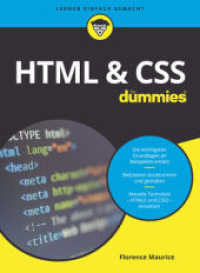- ホーム
- > 洋書
- > 英文書
- > Religion / Ethics
基本説明
Starting with early aesthtic theories of Ernest Fenollosa, made famous but also distorted by Ezra Pound, the book moves on to the countercultural voices such as Ginsberg, Kerouac, Snyder, Giorno, Waldman, and Whalen, and then considers the work of contemporary American writers of color influenced by Buddhism. An interview with Maxine Hong Kingston is included.
Full Description
Looks at Buddhist influences in American literature and how literature has shaped the reception of Buddhism in North America.
The encounter between Buddhism and American literature has been a powerful one for both parties. While Buddhism fueled the Beat movement's resounding critique of the United States as a spiritually dead society, Beat writers and others have shaped how Buddhism has been presented to and perceived by a North American audience. Contributors to this volume explore how Asian influences have been adapted to American desires in literary works and Buddhist poetics, or how Buddhist practices emerge in literary works. Starting with early aesthetic theories of Ernest Fenollosa, made famous but also distorted by Ezra Pound, the book moves on to the countercultural voices associated with the Beat movement and its friends and heirs such as Ginsberg, Kerouac, Snyder, Giorno, Waldman, and Whalen. The volume also considers the work of contemporary American writers of color influenced by Buddhism, such as Maxine Hong Kingston, Charles Johnson, and Lan Cao. An interview with Kingston is included.
Contents
Foreword by Maxine Hong Kingston
Acknowledgments
Introduction
John Whalen-Bridge and Gary Storhoff
PART I. Literature as Vehicle: Transmission and Transformation
1. The Emptiness of Patterned Flux: Ernest Fenollosa's Buddhist Essay "The Chinese Written Character as a Medium for Poetry"
Jonathan Stalling
2. Gary Snyder's Selective Way to Cold Mountain: Domesticating Han Shan
Yuemin He
3. John Giorno: Buddhism, Poetry, and Transgression
Marcus Boon
4. Buddhadharma and Poetry without Credentials
Michael Heller
PART II. Zen, Vajrayana, and the Avant-Garde: A Pluralistic Poetics
5. Finger Pointing at the Moon: Zen and the Poetry of Philip Whalen
Jane Falk
6. Keeping the Vision Alive: The Buddhist Stillpoint in the Work of Jack Kerouac and Allen Ginsberg
Erik Mortenson
7. Illumination through the Cracks: The Melting Down of Conventional Socio-Religious Thought and Practice in the Work of Gary Snyder
Tom Lavazzi
8. The American Poetic Diamond Vehicle: Allen Ginsberg and Anne Waldman Re-Work Vajrayana Buddhism
Jane Augustine
PART III. Widening the Circle: Buddhism and American Writers of Color
9. Buddhism, the Chinese Religion, and the Ceremony of Writing: An Interview with Maxine Hong Kingston
John Whalen-Bridge
10. A Bridge between Two Worlds: Crossing to America in Monkey Bridge
Hanh Nguyen and R. C. Lutz
11 'Opening the Hand of Thought': The Meditative Mind in Charles Johnson's Dr. King's Refrigerator
Gary Storhoff
Afterword
Charles Johnson
List of Contributers
Index







